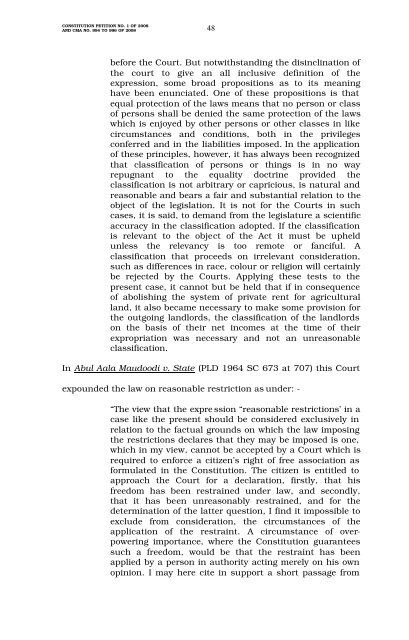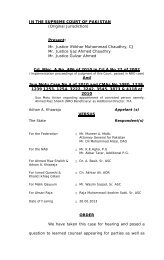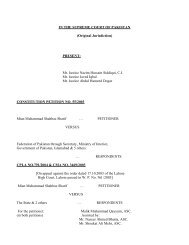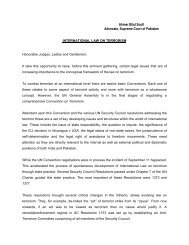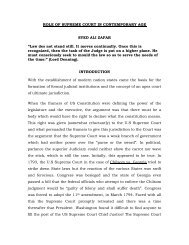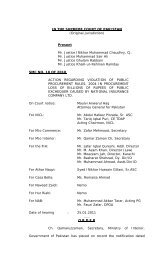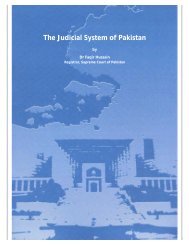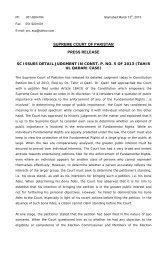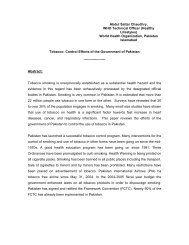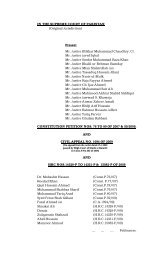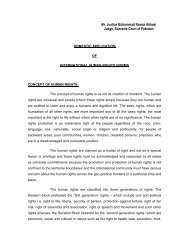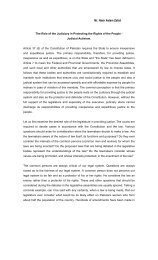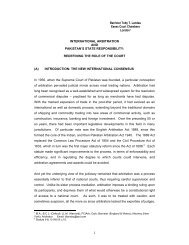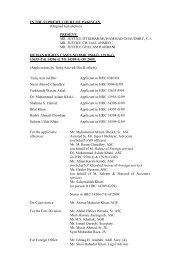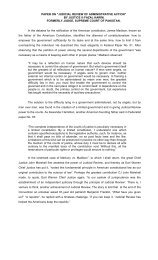MR. JUSTICE ABDUL HAMEED DOGAR, HCJ MR. JUSTICE FAQIR ...
MR. JUSTICE ABDUL HAMEED DOGAR, HCJ MR. JUSTICE FAQIR ...
MR. JUSTICE ABDUL HAMEED DOGAR, HCJ MR. JUSTICE FAQIR ...
You also want an ePaper? Increase the reach of your titles
YUMPU automatically turns print PDFs into web optimized ePapers that Google loves.
CONSTITUTION PETITION NO. 1 OF 2008<br />
AND CMA NO. 994 TO 996 OF 2008 48<br />
before the Court. But notwithstanding the disinclination of<br />
the court to give an all inclusive definition of the<br />
expression, some broad propositions as to its meaning<br />
have been enunciated. One of these propositions is that<br />
equal protection of the laws means that no person or class<br />
of persons shall be denied the same protection of the laws<br />
which is enjoyed by other persons or other classes in like<br />
circumstances and conditions, both in the privileges<br />
conferred and in the liabilities imposed. In the application<br />
of these principles, however, it has always been recognized<br />
that classification of persons or things is in no way<br />
repugnant to the equality doctrine provided the<br />
classification is not arbitrary or capricious, is natural and<br />
reasonable and bears a fair and substantial relation to the<br />
object of the legislation. It is not for the Courts in such<br />
cases, it is said, to demand from the legislature a scientific<br />
accuracy in the classification adopted. If the classification<br />
is relevant to the object of the Act it must be upheld<br />
unless the relevancy is too remote or fanciful. A<br />
classification that proceeds on irrelevant consideration,<br />
such as differences in race, colour or religion will certainly<br />
be rejected by the Courts. Applying these tests to the<br />
present case, it cannot but be held that if in consequence<br />
of abolishing the system of private rent for agricultural<br />
land, it also became necessary to make some provision for<br />
the outgoing landlords, the classification of the landlords<br />
on the basis of their net incomes at the time of their<br />
expropriation was necessary and not an unreasonable<br />
classification.<br />
In Abul Aala Maudoodi v. State (PLD 1964 SC 673 at 707) this Court<br />
expounded the law on reasonable restriction as under: -<br />
“The view that the expre ssion “reasonable restrictions’ in a<br />
case like the present should be considered exclusively in<br />
relation to the factual grounds on which the law imposing<br />
the restrictions declares that they may be imposed is one,<br />
which in my view, cannot be accepted by a Court which is<br />
required to enforce a citizen’s right of free association as<br />
formulated in the Constitution. The citizen is entitled to<br />
approach the Court for a declaration, firstly, that his<br />
freedom has been restrained under law, and secondly,<br />
that it has been unreasonably restrained, and for the<br />
determination of the latter question, I find it impossible to<br />
exclude from consideration, the circumstances of the<br />
application of the restraint. A circumstance of overpowering<br />
importance, where the Constitution guarantees<br />
such a freedom, would be that the restraint has been<br />
applied by a person in authority acting merely on his own<br />
opinion. I may here cite in support a short passage from


